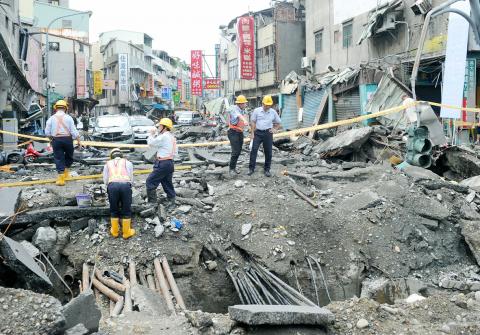Experts have called for the government to install a comprehensive pipeline monitoring system to avoid a repetition of the gas explosions that took place in Greater Kaohsiung on Thursday night and early Friday morning, causing at least 28 deaths and leaving 286 people injured.
Petrochemical companies have vast networks of underground pipelines in Kaohsiung, said Chen Chih-yung (陳志勇), professor of chemical engineering at National Cheng Kung University.
“To prevent such a tragedy from recurring, we must have transparency. People have the right to know the real information,” said Chen, who also serves on the board of CPC Corp, Taiwan (CPC, 台灣中油) as an independent director.

Photo: Wang Min-wei, Taipei Times
“The government should inform the public where the petrochemical pipelines are buried, then a monitoring system must be installed for the entire petrochemical pipeline network in the city. Also, the government must establish standard operating procedures for emergency responses,” he said.
Chen said the most important thing now is for the government to calm public fears.
“Of course, we must find out who is responsible for the gas explosions, but that is not the priority at this time,” he said. “The first thing to do is to tell the public where the pipelines are laid and where there are no pipelines. Like when an earthquake strikes, information on the epicenter is reported on the news, so people can be alert.”
However, Chen said he knows that if maps of underground pipelines were published, they might affect real-estate prices.
“However, people have the right to know. To understand a situation better can help in prevention. It’s not knowing what and where [the pipelines are] that is most frightening to people,” Chen said.
“CPC is the top boss of Taiwan’s petrochemical industry, so it should be the first to come out and make a comprehensive examination of all the old and aging pipelines,” he added, saying that all petrochemical companies have installed pressure gauges at both ends of pipelines, which help to detect leaks.
However, he said he was not sure whether there are pressure gauges throughout other sections of pipe and added that there are other engineering methods to check on leaks.
“For example, in culvert pipes, monitoring devices are installed at regular intervals. It costs more money to install such systems and there are other factors considered. So we are not sure whether Taiwan’s petrochemical companies have done so,” Chen said.

‘SECRETS’: While saying China would not attack during his presidency, Donald Trump declined to say how Washington would respond if Beijing were to take military action US President Donald Trump said that China would not take military action against Taiwan while he is president, as the Chinese leaders “know the consequences.” Trump made the statement during an interview on CBS’ 60 Minutes program that aired on Sunday, a few days after his meeting with Chinese President Xi Jinping (習近平) in South Korea. “He [Xi] has openly said, and his people have openly said at meetings, ‘we would never do anything while President Trump is president,’ because they know the consequences,” Trump said in the interview. However, he repeatedly declined to say exactly how Washington would respond in

WARFARE: All sectors of society should recognize, unite, and collectively resist and condemn Beijing’s cross-border suppression, MAC Minister Chiu Chui-cheng said The number of Taiwanese detained because of legal affairs by Chinese authorities has tripled this year, as Beijing intensified its intimidation and division of Taiwanese by combining lawfare and cognitive warfare, the Mainland Affairs Council (MAC) said yesterday. MAC Minister Chiu Chui-cheng (邱垂正) made the statement in response to questions by Democratic Progressive Party (DPP) Legislator Puma Shen (沈柏洋) about the government’s response to counter Chinese public opinion warfare, lawfare and psychological warfare. Shen said he is also being investigated by China for promoting “Taiwanese independence.” He was referring to a report published on Tuesday last week by China’s state-run Xinhua news agency,

‘ADDITIONAL CONDITION’: Taiwan will work with like-minded countries to protect its right to participate in next year’s meeting, the foreign ministry said The US will “continue to press China for security arrangements and protocols that safeguard all participants when attending APEC meetings in China,” a US Department of State spokesperson said yesterday, after Beijing suggested that members must adhere to its “one China principle” to participate. “The United States insists on the full and equal participation of all APEC member economies — including Taiwan — consistent with APEC’s guidelines, rules and established practice, as affirmed by China in its offer to host in 2026,” the unnamed spokesperson said in response to media queries about China putting a “one China” principle condition on Taiwan’s

Japanese Prime Minister Sanae Takaichi said yesterday that China using armed force against Taiwan could constitute a "survival-threatening situation" for Japan, allowing the country to mobilize the Japanese armed forces under its security laws. Takaichi made the remarks during a parliamentary session yesterday while responding to a question about whether a "Taiwan contingency" involving a Chinese naval blockade would qualify as a "survival-threatening situation" for Japan, according to a report by Japan’s Asahi Shimbun. "If warships are used and other armed actions are involved, I believe this could constitute a survival- threatening